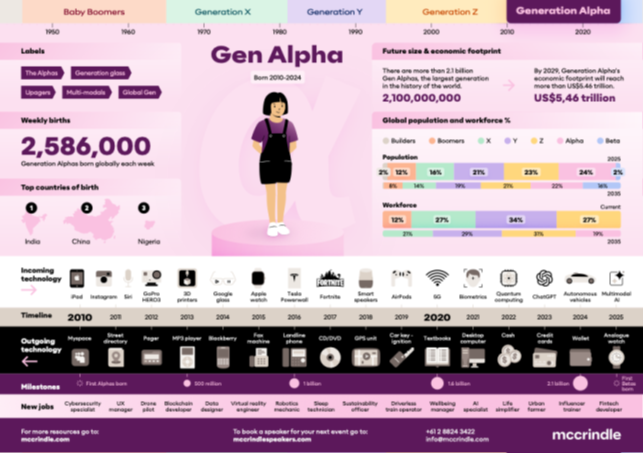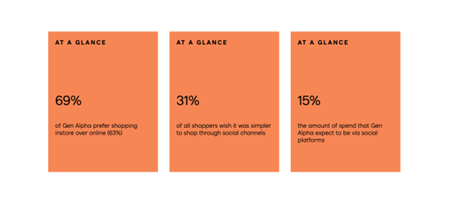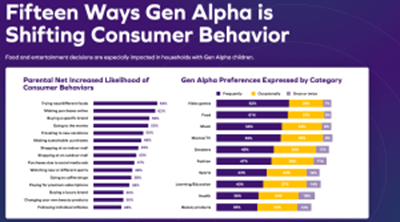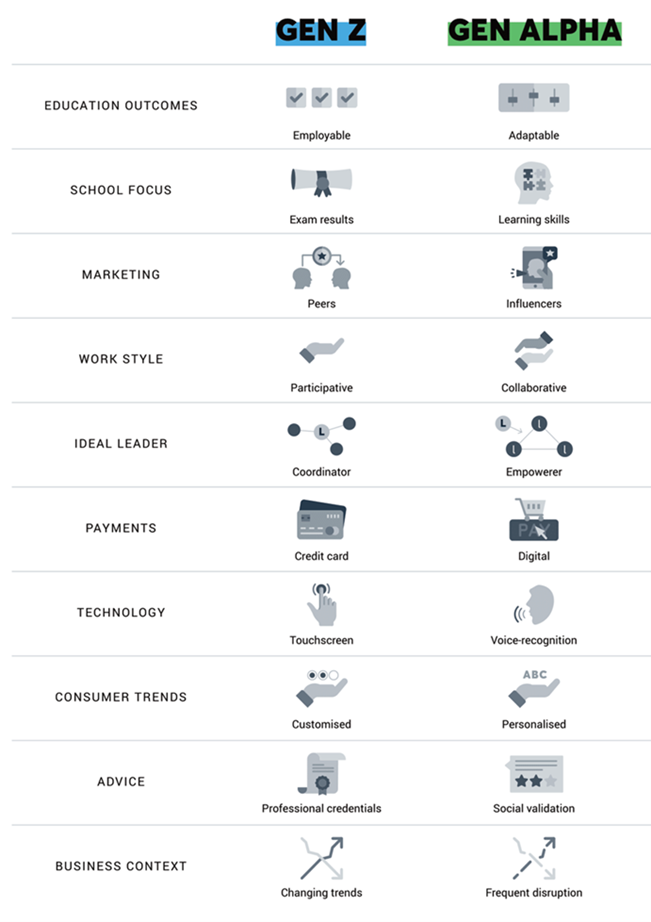Overview
By the end of 2025, this generation will number over 2.5 billion children worldwide, making it the largest in number and one of the most influential. According to McCrindle, they will account for 34% of the global workforce by 2030.
Born and raised in an entirely digital world, Alphas are autonomous, demanding, and already shopping influencer. They are redefining the codes of traditional marketing. In this article, Eminence offers you a strategic reading of this generation, so that you can adapt your marketing actions today.
Who are the Alpha generation children?

Born between 2010 and 2024, Alpha children are the first native-born generation of the 21st century. They are the children of Millennials and represent the fifth generation since the end of the Second World War. Their environment is profoundly marked by technology: tablets from the age of 2, first social networks around 8, on-demand content even before they can read.
89% of under-13s own a smartphone and spend more than 2 hours a day on it (Heaven, 2022).
Thanks to easy access to e-learning, such as tutorials and AI, their learning is autonomous, utilitarian and opportunistic. They prioritize skills over diplomas, and place a high value on immediacy.
Where does the term “Alpha Generation” come from?
While previous generations used the Latin alphabet (X, Y, Z), Mark McCrindle introduced the Alpha Generation concept by inaugurating the use of the Greek alphabet.
According to his institute, generations will become shorter and shorter, and will be characterized by technological and digital developments, rather than by historical or social events.

Characteristics of Generation Alpha
Ultra-connected kids
Alpha kids aren't just “digital natives”: they're techno-fluent. According to Morning Consult, 49% of them own their own tablet. By the age of 7, they have already accumulated a whole year's worth of screen time.
This intensive use develops their reflexes, hand-eye coordination and ability to move quickly from one task to another. 43% of parents say that technology stimulates their children's quick thinking (Hotwire).
However, these “iPad kids” are also aware of the dangers associated with hyperconnection: 74% of them say they voluntarily reduce their screen time in favor of outdoor activities to preserve their mental health (Razorfish).
Transparency, privacy and interactivity: what they expect from brands
These young consumers are particularly sensitive to the protection of personal data. Increasingly aware of their digital exposure, they - and their parents - expect brands to be transparent and educational about their digital practices.
Brands that adopt a clear, visual and understandable privacy policy will earn their trust. This is an integral part of the Alpha generation values: ethics, security, loyalty.

Which strategy to use to reach the Alpha generation?
Emotion, personalization and meaning
Alpha kids expect brands to understand them and speak to them sincerely. They want personalized, immersive experiences based on their interests: video games, humor, TV series, sports, fashion... and to a lesser extent, ecology.
By establishing an emotional connection with them, you increase the chances of purchase, recommendation and loyalty.
An omnichannel strategy designed just for them

Despite being digital natives, 66% still prefer to buy in-store, and 75% particularly appreciate the boutique experience (Epsilon, Clarkston Consulting).
A successful marketing strategy for the Alpha generation should be based on a phygital approach: immersive videos, intelligent product placement (e.g. Fortnite), enriched SEO (Google Lens, Voice Search), augmented reality, but also aligned website and point of sale.
At Eminence, we integrate these levers into your digital and retail strategies for a consistent experience across all channels.
The impact of children on their parents' purchases
The Alpha generation exerts a direct influence on family purchasing decisions: up to 87% of parents are sensitive to them. From the age of 5, they participate in the choice of snacks, clothing, electronic devices...
Their power of influence is estimated at over 300 billion dollars a year (Greenbook, Robin Report).
Brands therefore need to build dual customer journeys: a discourse adapted to adults, and a universe designed for children. Eminence can help with UX/UI design, content strategy and emotional storytelling to address these two targets.

(https://wwd.com/business-news/business-features/gen-alpha-influence-millennial-spending-1236380349/)
What tone should you adopt in your inbound marketing strategy?
Generation Alpha, like Gen Z, is suspicious of traditional advertising. They expect authenticity from brands, sincere recommendations and a transparent experience.
Products alone are no longer enough: they must embody a perceived value and convey a rewarding message. CSR values, respect for privacy and control of personal data have become major criteria.
Brands must offer added value in exchange for data: bonuses, exclusive experiences, premium content.
How Eminence can help you with your Alpha gen strategy ?
Given this connected, demanding and aware generation, brands need to adapt their approach at every level: content, formats, technologies, messages and channels.
At Eminence, we implement tailor-made digital strategies to effectively reach Generation Alpha while respecting its values. We support you in :
- creating engaging, immersive content,
- setting up personalized, omnichannel user paths,
- semantic and technical SEO optimization adapted to AI engines,
- activation of high-performance media and influencer campaigns,
- and the deployment of responsible, transparent strategies.
By combining behavioral data, cultural insights and technological tools, we help you build a lasting bond of trust with this generation of the future.
Summary
Q: Who belongs to Generation Alpha?
Children born between 2010 and the end of 2024.
Q: Why should we care?
Massive indirect purchasing power, parental influence, consumers of today and tomorrow.
Q: Which digital media should be favored?
YouTube, TikTok, influencers, immersive games, AR, storytelling.
Q: What's the difference with Gen Z?
➡️ Born digital, more demanding, more aware of social issues.

Q: What's next?
Since January 2025, children born into this generation have been part of the Beta generation.
Subscribe to our newsletter and gain access to strategic insights, exclusive analyses, and expert tips to enhance your online presence.
Conclusion
Generation Alpha doesn't just buy: it influences, advocates and actively participates. Their high expectations, demanding relationship with brands and growing influence make them a key strategic target.
To meet their needs, companies must offer a phygital, emotional and ethical experience, designed for both children and their parents.
Eminence helps you anticipate tomorrow's uses with an integrated approach: digital strategy, immersive content, SEO, performance media and UX design.









